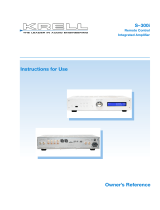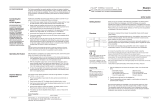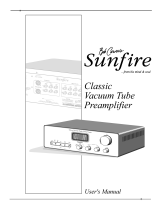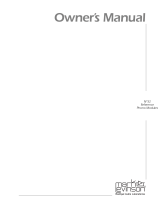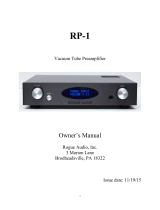Page is loading ...

KRELL INDUSTRIES, INC.
KRS-IA PREAMPLIFIER
OWNER’S MANUAL
February i, 1987
KRELL INDUSTRIES, INC

45 Connair Road
Orange, CT 06477-0533, USA
KRS-IA PREAMPLIFIER/SUPPLY ASSIGNMENT
KRS-IA Preamplifier Serial Number
should be connected to:
KRSP Power Supply Serial Number
Also,
KRS~IA Preamplifier Serial Number
should be connected to:
KRSP Power Supply Serial Number

KRS-IA PREAMPLIFIER
Thank you for purchasing the KRS-IA Preamplifier. The KRS-IA
is the latest evolution in KRELLs’ preamplifier technology
and represents advances is circuitry sophistication and
sonic quality not found in any other preamplifier at any
cost. Two notable design features are its’ completely mono-
phonic operation and the absence of any capacitors in the
signal path. Please read this instruction manual completely
before using the KRS-IA. Its’ installation and operation are
very easy to understand and it will provide many years of
trouble-free performance. Please be sure to return the en-
closed warranty card.
UNPACKING
While unpacking the KRS-IA please inspect the units for
shipping damage. If any damage is evident contact your
dealer or the factory immediately. If the unit is in proper
condition proceed with installation. In addition to the two
preamplifier chassis and two power supply chassis you will
find two short DC cables for connection between the supplies
and preamps, and one allen driver to be used for removing
the top cover and phono board. The purpose of these oper-
ations will be detailed below.
INSTALLATION
The KRS-IA is designed to be set up with the two preamp
chassis sitting on top of the two power supplies. Before
proceeding with the final installation please read the Phono
Section Set Up and C.D. Section Set Up portions of the
manual as they involve removal of the preamp top covers.
This is much easier to accomplish before the entire preamp
is in place. After completing set up of the Phono and C.D.
sections place the four chassis where they will be perma-
nently. Connect the two DC cables between the eight pin
connectors on the supplies and the preamps. The AC cables
can now be connected between the supplies and the AC mains.
You can now proceed with connection of the various source
components in your system. The rear panel inputs follow,
from left to right as viewed from the front, the assignment
on the "Select" switch from phono to tuner, etc. Typically
the top chassis is used for the left channel, the bottom
one for the right channel.
After the inputs are the Record Outputs.
Last are two sets of Main Outputs. These operate in unison
and are provided as a convenience for routing to two inde-
pendant systems.

NOTES ON INSTALLATION
Be sure the volume controls are fully counterclockwise
before making connections to the KRS-IA; also, the power
amplifier(s) should be off while making connections. Place
all power amps, C.D. players or other power supplies a
reasonable distance from the KRS-IA as they might induce
hum into the phono section. Our custom RCA connectors are
made to very exact standards. Connectors of lesser quality
can damage them or function improperly. Please check with
your dealer or the factory as you could cause damage to
your system or jeopardize your warranty.
PHONO SECTION SET UP
The KRS-IA is shipped with the phono section set up for a
moving coil cartridge and loaded to 100 ohms. The loading
can be changed with a set of internal switches. To access
these switches the top cover of the preamps must be removed
with the supplied allen driver. The phono section is located
on the left side of the unit, as viewed from the front. In
the middle rear of the phono PC board, which is mounted on
standoffs, there is an 8 position switch.
The various load possibilities are detailed below:
all switches in the open position =
all switches open except switch 8 on
all switches open except switch 7 on
all switches open except switch 6 on
all switches open except switch 5 on
all switches open except switch 4 on
all switches open except switch 3 on
all switches open except switch 2 on
all switches open except switch 1 on
all switches on
47,000 ohms
= 1,000 ohms
= 800 ohms
= 470 ohms
= 250 ohms
= 100 ohms
= 47 ohms
= 25 ohms
= 10 ohms
5 ohms

C.D. SECTION SET UP
The Compact Disc input of the KRS-IA is routed through an
adjustable three pole phase correcting filter, a feature
unique to KRELL preamps. The switches to adjust the filter
are located underneath the phono section PC board. To access
them, remove the phono section board by taking out the two
screws holding the board in place with the allen driver.
then simply slide the board forward out of its’ connector
and out of the preamp. The 8 position switch, identical to
the phono loading switch, will now be visible.Below is a
listing of settings for various C.D. players.
Kyocera 901
Kyocera, other models
Magnavox 650
Meridian MCD & Pro
NAD
Nakamichi OMS 5 & 7
Pioneer SCD 909
PS Audio CD 1
Sony 101 & 701 ES
Sony CD 302
i, 2 open, 3, 4, 5, 6,
7, 8 on
i, 3,
5, 6, 7 open, 2,
4, 8 on
4, 5,
8 open, i, 2,
3, 6, 7 on
i, 6,
7 open, 2, 3,
4, 5, 8 on
i, 3,
4, 5, 6, 7 open,
2, 4 on
i, 3,
4, 6, 7 open, 2,
5, 8 on
2, 3 open, i, 4, 5, 6,
7, 8 on
3, 6, 7, 8 open, i, 2,
4, 5 on
i, 2, 3 open, 4, 5, 6,
7, 8 on
3, 4, 5, 6, 8 open, i,
2, 7 on
If you do not find your player listed you can contact your
dealer or the factory for settings. In general, if you have
a Sony type unit adjust I, 2, 3, 8 open, 4, 5, 6, 7 on; if
you have a Phillips type unit adjust to 3, 4, 5, 6, 7 open,
i, 2, 8 on. These are average settings for the two systems.
After adjusting the C.D. filter replace the phono section
board by reversing the removal procedure described above.

ADDITIONAL C.D. SETTINGS
P.S. Audio CDI
Nakamishi OMS-7
Magnavox 650
Stax Q
Mission 707
Yamaha
Adcom GCD-300
Kinergetics CDC 20A
McIntoch
Onkyo DX 330
Sony CDP-620ES
Denon DCD-1700
3-6-7-8 open i-2-4-5 on
I-3-4-6-7 open 2-5-8 on
4-5-8 open I-2-3-6-7 on
3-4-8 open I-2-5-6-7 on
2-8 open i-3-4-5-6-7 on
2-8 open i-3-4-5-6-7 on
i-3-4-7 open 2-5-6-8 on
3-4-5-8 open I-2-6-7 on
3-4-5-6-7-8 open I-2 on
4-5-6-7 open i-2-3-8 on
4-5-6-7-8 open i-2-3 on
3-4-5-6-8 open i-2-7 on

z
o
’ 8
7
6
, 5
4 .
¯
3
2
1
S-5
8
7
3
o
2
1
S-2
8
7
6
5
4
3
,
2
.
1
S-4
z
~
0
PREAMP FRONT
/






